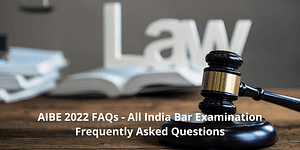BSc LLB
Overview of BSc LLB
BSc LLB or Bachelor of Science and Bachelor of Legislative Law is a 5-years integrated undergraduate course designed for individuals who are interested in learning the principles of both science and law at the same time. BSc LLB is a foundational course that teaches students about the legal profession and procedures and helps the individual in developing a critical, logical, and analytical understanding of legal affairs along with scientific understanding.
BSc LLB Admissions are based upon BSc LLB entrance examinations conducted by both public and private universities and to pursue a 5 Years BSc LLB Course, one must clear the Class XII board examination and secure at least 50% of marks in the relevant board examination.
BSc LLB Top Colleges include KIIT School of Law, BML Munjal University, Amity University Mumbai, Chandigarh University, Nirma University, Kalinga University, etc.
BSc LLB Course Fees depend upon the institutes offering the BSc LLB Course. The BSc LLB Course Fees depend upon certain factors like faculty, pedagogy, curriculum, ranking, etc. BSc LLB Fees range around INR 5,00,000-10,00,000 per annum.
BSc LLB Jobs include various respected profiles such as a Legal Advisor, Judge, Legal Manager, Professor, Teacher or Lecturer, Legal Journalist, Notary, Legal Associate, Science Advisor, Science Reporter, etc. BSc LLB Jobs have handsome salaries and are considered reputed across the world.
BSc LLB Salary depends upon the individual's skill set. BSc LLB Salary depends upon the organization or company in which the individual is hired. BSc LLB Salary starts from INR 8,00,000 per annum to INR 15,00,000 per annum.
After completion of a BSc LLB degree, one can either choose to work or do higher studies like pursuing LLM, Ph.D. or get a good job with a decent salary, to upgrade their expertise and skills.
Table of Contents
- Overview of BSc LLB
- BSc LLB Programme Highlights
- Advantages of a BSc LLB Course
- For whom is the BSc LLB course crafted?
- BSc LLB Best Colleges in India
- BSc LLB Entrance Examination
- BSc LLB Required Skill Set
- BSc LLB Eligibility
- BSc LLB Admission Process
- Significance of BSc LLB Course in India
- What is the right time to start your BSc LLB Course?
- BSc LLB Admission Procedure
- BSc LLB Course Fees
- BSc LLB Syllabus
- BSc LLB Entrance Exam Syllabus
- BSc LLB Jobs
- BSc LLB Salary
- BSc LLB Employment Areas
- BSc LLB Top Recruiters
- FAQs about B.Sc LLB
BSc LLB Programme Highlights
Some of the quick facts about BSc LLB course are tabulated below:
Course Name | Bachelor of Science & Bachelor of Legislative Law |
|---|---|
Short Name | BSc LLB |
Course Level | Undergraduate |
Course Stream | Science |
Course Duration | 5 Years |
Eligibility Criteria | 10+2 |
Selection Procedure | Entrance Exam Based |
BSc LLB Course Fees | INR 5,00,000-10,00,000 per annum |
BSc LLB Jobs | Legal Counsellor, Legal Consultant, Advocate, Judge, Notary, Lab Technician, Science Advisor, etc. |
BSc LLB Salary | INR 8,00,000-INR 15,00,000 per annum |
Advantages of a BSc LLB Course
BSc LLB is one of the reputed courses offered across the world. The BSc LLB graduates are in huge demand throughout India and abroad and can get gainful opportunities to work. The BSc LLB Course Fees is also less and The BSc LLB Salary is good.
Mentioned below are a few merits of pursuing a BSc LLB Course:
- Gainful Career Possibility: There are a lot of job opportunities in the private & public sectors for BSc LLB professionals. These industries are ever expanding and thus BSc LLB Jobs are always in demand.
- Scope of Higher Studies: After completion of the BSc LLB Course one can enhance their skills by opting for a Master of Law (LLM), Ph.D., etc.
- Profitable Salary Package: After completing the BSc LLB Course, BSc LLB Salary ranges anywhere between INR 6,00,000 LPA to INR 8,00,000 LPA depending upon their skills.
- Financial Stability: BSc LLB in starting may require a lot of struggle & hard work but one may have both financial stability as well as job satisfaction after completing BSc LLB Course.
- Entrepreneurship: Individuals after completing the BSc LLB Course also have an option of using their BSc LLB certification & the acquired skill set to practice independently while opening their own law firms etc.
- Internships: While pursuing a BSc LLB degree, candidates can apply for internships, which will further assist them to get a job with ease.
- Integrated Course: BSc LLB is an integrated course thus provides knowledge of 2 subjects under one degree. It also helps in saving years that would be required to qualify for BSc and LLB separately.
For whom is the BSc LLB course crafted?
- Aspirants who are interested in making a career in the legal field and who want to gain scientific knowledge alongside should definitely choose the BSc LLB Course.
- Aspirants who want secured careers by joining top firms and government organizations or the ones who want to practice independently can choose a BSc LLB Course.
BSc LLB Best Colleges in India
There are many public and private universities offering BSc LLB course in India. Candidates are advised to go through the table thoroughly and then decide the desired college of their choice.
College Name | Location | (per annum) BSc LLB Course Fees |
|---|---|---|
| KIIT School of Law | Bhubaneshwar, Orissa | INR 4,19,000 |
| GNLU Gujarat | Gandhinagar, Gujarat | INR 8,92,000 |
| Parul University | Vadodara, Gujarat | INR 1,00,000 |
| Lovely Professional University | Jalandhar, Punjab | INR 1,37,000 |
| M.S. Ramaiah College of Law | Bangalore, Karnataka | - |
| KLE Society’s Law College | Bangalore, Karnataka | INR 90,000 |
| Dr. B.R. Ambedkar College of Law | Vishakhapatnam, Andhra Pradesh | INR 1,92,000 |
| Nirma University | Ahmedabad, Gujarat | INR 2,34,000 |
| Chandigarh University | Chandigarh | INR 1,20,000 |
| SDM Law College | Mangalore, Karnataka | INR 30,000 |
| Mahatma Jyotirao Phule University | Jaipur, Rajasthan | INR 85,0000 |
| Kalinga University | Raipur, Chattisgarh | INR 1,30,250 |
| Amity University | Mumbai, Maharashtra | INR 1,86,000 |
| OPJS University | Churu, Rajasthan | INR 36,200 |
| G.H. Raisoni University | Saikheda, Madhya Pradesh | INR 45.900 |
| Mansarovar Global University | Bhopal, Madhya Pradesh | INR 75,000 |
| University of Technology | Jaipur, Rajasthan | INR 60,000 |
| Bhagwant University | Ajmer, Rajasthan | INR 28,700 |
BSc LLB Entrance Examination
After qualifying for the relevant BSc LLB entrance examination candidates are offered admission on the merit list prepared after the BSc LLB entrance examination results, personal interview, etc. Some of the popular BSc LLB entrance examinations with their details are listed below:
BSc LLB Required Skill Set
The BSc LLB Course is quite complex as it is a fusion of both Science subjects and Law subjects. The entire journey of the BSc LLB Course demands knowledge of the subjects along with certain skills. Thus, completing a BSc LLB degree can be very demanding.
Law is considered as a holistic profession; thus, only passing the degree of BSc LLB exams is not enough. Clearing exams will definitely grant certification but one needs to acquire the desired and expected skill set in the law industry. Mentioned below are some of the demanded skills in the law industry, candidates must have at least a few or a combination of them to have a bright future, and if not they must acquire these.
| Time-Management Skills | Diligence |
Discipline |
|---|---|---|
Scientific Knowledge | Patience | Resilience |
Self-Confidence | Quick Learner Abilities | Critical-Thinking Ability |
Organizational Skills | Good Communication | Interest in Legal Research & Analysis |
Integrity | Analytical Skills
| Decision-Making Skills |
Self-Motivation Skills | Leadership | Problem-Solving Attitude |
BSc LLB Eligibility
The eligibility norms for a BSc LLB Course vary across universities. Highlighted below are the BSc LLB Course eligibility criteria:
- Candidates must have completed their Graduation in the Science stream from a recognized board.
- General category students must obtain a minimum of 50% marks and reserved category students must get at least 45% marks to take the BSc LLB Course.
- Further one must qualify for the BSc LLB entrance examination and personal interview to get admission into the desired BSc LLB college.
BSc LLB Admission Process
- The BSc LLB admission is usually offered on the basis of the entrance examination.
- To pursue the BSc LLB course, aspirants must clear the relevant BSc LLB entrance examination.
- Many well-known BSc LLB entrance examinations conducted in India include DU LLB Entrance Exam, CLAT, LSAT, ULSAT, AILET, ILSAT, etc.
- After qualifying for the relevant BSc LLB entrance examination, one is granted admission on the basis of the BSc LLB entrance examination score, personal interview, availability of seats, etc.
Significance of BSc LLB Course in India
Law touches practically every facet of human existence, such as politics, human rights, economics, business, foreign trade, environment, foreign diplomacy, etc. It’s a well-known fact that the first academic degrees were all related to law. A lot of good and reputed colleges are there in India offering BSc LLB Course. Thus the significance of a BSc LLB degree in a country like India comes in huge demand, especially in contemporary times. BSc LLB Course is considered reputed, affordable, and well-paid in India as well as abroad.
What is the right time to start your BSc LLB Course?
BSc LLB requires a huge amount of hard work and dedication to complete. Aspirants must be aware of certain points before starting the BSc LLB Course. These points are given below:
- Candidates can immediately start with their BSc LLB after completing their Class XII. Graduates from the Science stream are eligible for BSc LLB Course.
- Candidates must have a minimum of 5 years of time to complete a BSc LLB degree.
- The BSc LLB Syllabus is comparatively vast and requires the candidates to give their maximum effort to qualify within the initial time period of 5 years. Apart from the theoretical concepts the candidates must grasp the practical part of the BSc LLB Syllabus as well.
- Candidates must also put in extra time and effort to qualify for the BSc LLB entrance exam because the BSc LLB degree acquired from government colleges holds much more value than the certificate from BSc LLB private institutes.
- Aspirants must gather financial means to carry on with the BSc LLB Course.
- BSc LLB Course is moderately difficult, thus the individual should be able to devote dedicated hours for self-studying and further for clearing the course.
BSc LLB Admission Procedure
Candidates aspiring to get admission to BSc LLB Course will have to face tough competition. Here are some points which they need to follow to get admission to top BSc LLB Colleges.
- Firstly, the candidate has to qualify for the relevant law exam.
- After the results are out, all the colleges will declare their cutoffs for the BSc LLB Course.
- Students who make it to the cutoff list are then called upon for a personal interview.
- One who clears the interview is then given admission on the basis of counseling wherein their documents are verified, and availability of course, and the seat is ensured.
- Some additional institutions are known to offer direct admission, i.e. admission based on a donation.
BSc LLB Course Fees
BSc LLB Course Fees vary in every institute depending on certain factors such as ranking, infrastructure, curriculum design, etc. BSc LLB Course Fees in India range from INR 5,000-INR 10,00,000 per annum. Students must focus on different parameters like placement record, faculty, and curriculum and then take admission.
BSc LLB Syllabus
BSc LLB Syllabus is divided into 5 full years, further subdivided into 10 semesters. Though the BSc LLB Syllabus differs across law schools and universities, there are few subjects that remain common across all government and private law colleges as they form the basic crux of the BSc LLB Course. The semester-wise syllabus is listed below for your reference.
First Year Syllabus
Semester-I | Semester-II |
|---|---|
| Law of Contract-I | Law of Contract-II |
| Legal Method | Digital Electronics: Microprocessors & Interfaces |
| Electronic Devices, Circuits & IC Technology | History |
| English & Legal Language | Techniques of Communication, Client Interviewing & Counselling |
| Concepts of Chemistry | Techniques of Chemistry |
| Biotechnology | Tools & Techniques of Biotechnology |
| Chemistry | Biotechnology |
| Electronics | Chemistry |
| Introductory Biotechnology & Cell Biology | Electronics |
Second Year Syllabus
Semester-III | Semester-IV |
|---|---|
| Family Law-I | Family Law-II |
| Law of Crimes-I | Law of Crimes-II |
| Constitutional Law-I | Biotechnology |
| Business Laws | Law of Torts & Consumer Protection |
| Advocacy Skills | Administrative Law |
| Polymer Chemistry | Physical Pharmacy |
| Telecom Engineering, Fundamentals, Data & Wireless Communication | Constitutional Law-II |
| Electronics | Chemistry |
| Genetics, Immunology & Molecular Biotechnology | Electronics |
| Chemistry | Programming Fundamentals & Data Base Management System |
| Biotechnology | Microbial Biotechnology & Fermentation Technology |
Third Year Syllabus
Semester-V | Semester-VI |
|---|---|
| Code of Criminal Procedure-I | Code of Criminal Procedure-II |
| Law of Evidence | Jurisprudence-II |
| Code of Civil Procedure-I | Code of Civil Procedure-II |
| Plant and Animal Biotechnology | Public International Law |
| Jurisprudence-I | Property Law |
| Synthetic Organic Chemistry | Information Theory, Coding, and Network Programming |
| Corporate Law | Investment and Competition Law |
| Human Rights Law | Pharmaceutical Chemistry |
Fourth Year Syllabus
Semester-VII | Semester-VIII |
|---|---|
| Genetic Engineering and Genomics | International Trade Law |
| Law & Technology | Internet, E-Commerce, Multimedia Tools & Information System Security |
| Intellectual Property Right | Computer Applications |
| Land Laws | Election Law |
| Labour Law-I | Women & Law |
| Biotechnology | Alternative Dispute Resolution |
| Law, Poverty, and Development | |
| Air & Space Law | |
| International Commercial Law |
Fifth Year Syllabus
Semester-IX | Semester-X |
|---|---|
| Legal Writing and Research (Seminars and Research paper) Internals | Internship (Lawyers/Law Firms) |
| Drafting, Pleading, and Conveyancing | Dissertation |
| Legal Ethics and Court Craft |
BSc LLB Entrance Exam Syllabus
As we know that BSc LLB admissions are secured on the basis of the BSc LLB entrance examination. The BSc LLB entrance exam syllabus is quite similar across all the BSc LLB entrance examinations conducted in India and is listed below:
- General English
- Legal Reasoning
- Current Affairs
- Logical Reasoning
- Quantitative Aptitude
How to Prepare for BSc LLB Entrance Exams?
Some of the essential tips for cracking BSc LLB entrance exams are provided below:
- Be informed about the details of the entrance, time, date, exam center, and admit card date, so that you can strategize your exam preparation as well as all the other important details in the right way.
- Assess and review the test format, instructions, and question types.
- Go through solved sample questions and previous years' question paper explanations to familiarize yourself with the structure of the exam.
- Make sure to get yourself some of the finest BSc LLB entrance exam study materials. These books will also ensure great results.
- Review at least one set of commercial preparation materials for an important strategy on approaching.
The detailed topic-wise BSc LLB entrance exam syllabus is tabulated below:
Subjects | Important Topics |
|---|---|
| General English | Fill in the Blanks, Phrase Replacement, Tenses, Sentence Sequential Arrangement, Error Spotting, Correcting Incorrect Grammar Sentences, Synonyms & Antonyms, Choosing the Correct Sentences, Spotting Grammatical Errors, Active & Passive Voice, etc. |
| Legal Reasoning | Important & Recent Acts and Amendments of the Legislature, Indian Constitution, Legal Maxims, Important Supreme Court Judgments, Current Affairs, Contract Law, Constitutional Law, Criminal Law, Public International Law, Legal GK, Tort Law, International Treaties & Conventions affecting National Legal Framework, Legal Matters, Contemporary Legal, and Moral Issues, Public Policy, Environmental Law, Moral Philosophical Enquiries, etc. |
| Current Affairs | National & International Affairs, Sports, Significant Historical Events, Summits & Conferences, Schemes, Science & Technology, Awards & Honours, Art & Culture, Current events in India and the World, Foreign Affairs, etc. |
| Logical Reasoning | Weakening & Strengthening Arguments, Statements & Assumption, Cause & Effect, Statements & Course of Action, Statements & Arguments, Syllogism, Statement & Inference, etc. |
| Quantitative Aptitude | Charts, Bars, and Other Graphical Representations, Caselet D I (Passage Based), Mixed Graphs, Elementary Mathematics, Bar Graphs, Pie Chart, Tables, Line Graphs, etc. |
BSc LLB Jobs
BSc LLB attracts a lot of job opportunities as their credentials are well-identified across the world. Some of the top job profiles with work details are given below:
- Law Officer: Responsible to manage all the legal facets of the organization. The main work is to keep the organization out of any kind of legal trouble.
- Advocate: They are the legal representative of their clients, individuals, or companies. Advocates regulate and solve clients’ legal activities and problems from top to bottom.
- Law Reporter/Legal Journalist: They are required to work remotely and aid with law-related reporting and news desk coordination. Law Reporters have good copy-editing and fact-checking skills and a strong interest in legal news. They can work for a specific news channel or on a freelance basis or also with a publication house.
- Lecturer: A lecturer generates lessons and lectures related to legal studies.
- Notary: A notary usually witnesses legally binding signatures on documents, aids in identifying fraud or coercion, aids in the verification of identification of contract participants, administers oaths, handles affidavits, contracts, loan documents, marriage certificates, and other legal documents, etc.
- Government Lawyer: Represents clients in criminal and civil litigation and other legal proceedings, draws up legal documents, and manages or advises clients on legal transactions. Terms are specialized in a single area or may practice broadly in many areas of law.
- Legal Advisor: Their job consists of providing legal assistance, organizing various legal activities, completing them, creating legal documents, and advising the clients or the organization on all the relevant legal issues.
- District Court Judge: These judges pass jurisdictions & verdicts for the cases presented in front of the district court.
- Sessions Court Judge: They pass jurisdictions and verdicts for the cases presented in front of the sessions court.
BSc LLB Salary
Depending on the talent of the candidate, BSc LLB certified professionals can earn an annual salary varying from INR 8,00,000 per annum to INR 15,00,000 per annum and can even go upto 20,00,000 per annum depending upon years of experience, skill set, an organization one is employed in. Listed below are the best BSc LLB Jobs and BSc LLB salary packages offered to BSc LLB certificate holders to give you a fair idea.
BSc LLB Jobs | Average Salary |
|---|---|
Law Officer | INR 4,50,000-INR 6,50,000 per annum |
District Court Judge | INR 15,00,000- INR 18,00,000 per annum |
Advocate | INR 7,00,000- INR 10,00,000 per annum |
Sessions Court Judge | INR 22,00,000-INR 25,50,000 per annum |
Private Practice | INR 9,00,000-INR 15,00,000 per annum |
Legal Advisor | INR 4,50,000-INR 7,00,000 per annum |
Lecturer | INR 4,60,000-INR 6,00,000 per annum |
INR 3,50,000- INR 4,00,000 per annum | |
Government Lawyer | INR 6,50,000- INR 8,00,000 per annum |
INR 3,61,000- INR 5,45,000 per annum |
BSc LLB Employment Areas
BSc LLB professionals are hired in almost all industries and across varied sectors. These include not only government departments and Law Ministry and other ministries of GOI, but also Financial, HR, IT, and even Edtech, and even these include:
- Banks
- Courts
- Colleges & Universities
- Telecom
- Law Firms
- Corporate Business Houses
- Multinational Companies
- Legal Consultancies
- News Channels
- Government Offices
BSc LLB Top Recruiters
Some of the top recruiters offering jobs to BSc LLB professionals are given below. BSc LLB jobs are granted both in well-established law firms and start-ups. One may even take up internships with well-known firms in the last year of the degree so that at the time of placement, the chances of getting selected by top firms increase.
- Amarchand & Mangaldas
- AZB & Partners
- Suresh A Shroff & Co.
- Khaitan & Co.
- J Sagar and Associates
- Trilegal
- Luthra & Luthra Law Offices
- S&R Associates
- Economic Laws Practice
- Talwar Thakore & Associates
- Desai & Diwanji
FAQs about B.Sc LLB
Name the best colleges to pursue B.Sc LLB?
Who is eligible for a BSc LLB Course?
Candidates who have completed his/her Class XII and have scored at least 50% are eligible to pursue a BSc LLB course.
Which is better: 5 Yr BSc LLB or 3 Yr BSc LLB?
Pursuing a 3-year or 5-year BSc LLB Course, it totally depends upon the interest of the student in the field of law. Both are considered equally good at their own places.
Can a BSc LLB Course be done through correspondence ?
No, a student is required to have a full-time or regular degree of BSc LLB in order to practice law in future.
Can one pursue a BSc LLB Course from a private university?
One can definitely pursue a BSc LLB from private as it is valid and accepted. It has similar value as a government university.
Which is more difficult, BA LLB or BSc LLB?
BSc LLB is primarily difficult in comparison to BA LLB as BSc LLB has some technical and science related subjects.
What is the age limit for pursuing a BSc LLB Course?
There is no specific age limit for a BSc LLB Course. It is advisable to be in the age gap of 21-35 years to get better opportunities.
Can a BSc LLB be done with a job?
BSc LLB being a full time course cannot be done simultaneously with any government or private job as it is not permitted.
What is the duration of the BSc LLB Course?
The duration of the BSc LLB Course is 5 years.
What is the average fees for the BSc LLB Course?
The BSc LLB Course Fees in India range between INR 1,00,000 to INR 3,00,000 approximately. BSc LLB Course Fees abroad range between INR 15,00,000- INR 25,00,000 LPA.
What are the top colleges offering BSc LLB in India?
Delhi University, Amity University Mumbai, Nirma University, GNLU Gandhinagar, Chandigarh University are some of the top colleges for pursuing BSc LLB.
3 years long LLB or 5 years long B.Sc LLB law course? Which is better?
What topics are taught in the first year of B.Sc LLB?
Can B.Sc LLB be pursued through correspondence?
How is the syllabus of B.Sc LLB different from LLB?
What employment opportunities are available after B.Sc LLB?
What is the career scope for B.Sc LLB?
B.Sc LLB students can practice under a reputed lawyer and with experience can start their own practice. They can also start practicing in private and government sectors. In the public sector, B.Sc LLB graduates can work in Tax Department/ Labor Department and others.
What is the salary extracted after completing B.Sc LLB?
Can B.Sc LLB be pursued after completing an undergraduate degree?
What is the duration of B.Sc LLB?
Is any entrance exam required for admission to B.Sc LLB?
Can a B.Sc LLB be pursued after studying commerce in class 12th?
Can/ should science students pursue law?
Law as a course is a very democratic subject tailored for maximum intake of the masses, therefore the eligibility criteria only desires a certain tenure of education and unlike MBBS or Engineering does not require a specific set of subjects to apply. However, it does prescribe a minimum standard of grades before entry to the course. Now, as science student a degree in law can provide you with flourishing opportunities in terms of careers and recently two integrated courses in Law that are, B.Sc LL.B and B.Tech LL.B have provided the students with an opportunity to combine the two variant fields into a single programme. Science students can find themselves to be in-house counsels in corporate sectors and can also find a good career as a Patents expert, etc. The LLB course curriculum by itself is pretty standard and therefore it is upon the student to choose the specialisation of their respective graduation degrees.
What are the career prospects after studying B.Sc LLB?
After completing B.Sc LLB, there are many career options such as Lawyer, Legal Advisor, Legal Journalist, Document Drafting Lawyer and others.
What is the course curriculum for B.Sc LLB ?
The course curriculum of B.Sc LLB includes - Chemistry, History, Law Subjects such as Administrative Law, English and Legal Langauge, etc.
Related Questions
Popular Courses
- Courses
- B.Sc LLB


















